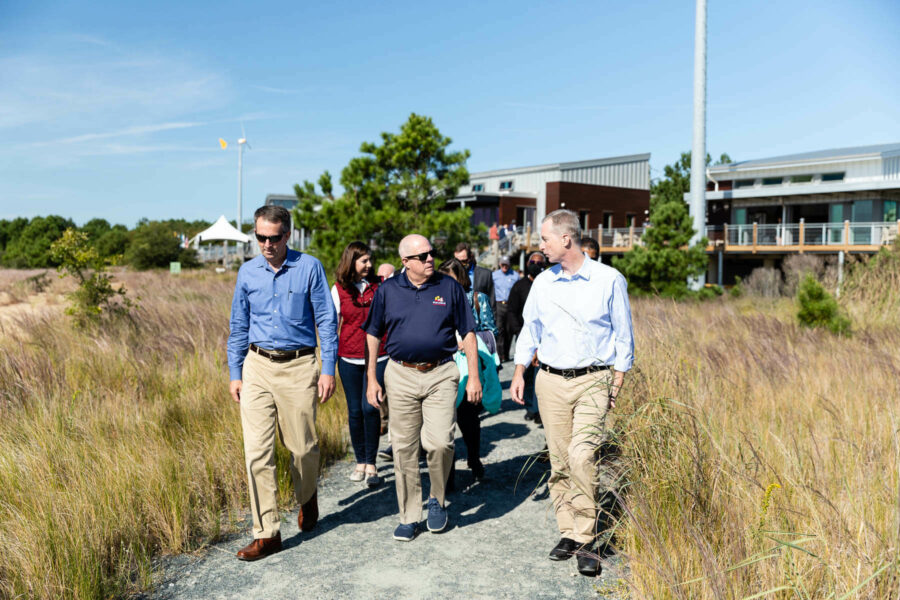The Chesapeake Bay Program takes action on climate change

On a beautiful afternoon in Virginia Beach, Virginia, with nary a cloud in the sky and the temperature a perfect 72 degrees, the words “climate change” would ordinarily not cross someone’s mind. But for the small, socially-distanced crowd gathered at the Brock Environmental Center, it was at the forefront of everyone’s thoughts.
Members of the Chesapeake Executive Council gathered today to join their colleagues in signing a directive that commits the Chesapeake Bay Program to address the increasing threats of climate change in all aspects of the partnership’s work.
"The Climate Directive we are signing today is the latest example of why this partnership is so important, said David Bulova, chair of the tri-state, legislative Chesapeake Bay Commission. “Collective action allows us to apply the best science possible so that we can understand and mitigate the impacts of a changing climate and prioritize resources toward our most vulnerable communities. We need to do to this if we want a more resilient landscape and watershed.”
There was no more appropriate place to announce this directive than Virginia Beach. The Virginia Coastal Resilience Master Planning Framework notes that the sea level in the region has risen more than 18 inches in the past 100 years and is anticipated to continue increasing at an even faster rate in the future thanks to more extreme weather, such as heavier rainfall. But this is not an issue that is restricted to areas along the Chesapeake Bay. Impacts from climate change are being felt throughout the entire 64,000 square mile watershed.
- In the 10-year period between 2004 and 2014, the number of days with coastal flooding in the state of Delaware rose from 64 to 143 per year.
- Changes in climate attract invasive species and pests. The District of Columbia now experiences five more mosquito “disease danger days” each year than it did in the 1970s, causing a significant public health risk.
- Waters around Baltimore, Maryland have risen approximately one foot over the last century.
- The state of New York has found that leaves are showing on trees more than eight days earlier and flowering more than four days earlier in the spring than in the 1950s.
- In their Climate Impacts Assessment 2021, Pennsylvania noted that average annual temperatures across the state had risen 1.2 degrees since 2000 and are on pace to rise almost six degrees by 2050.
- West Virginia experienced its wettest year on record in 2018, when just under 97 inches of rain fell. The state’s average annual rainfall is around 45 inches, an increase of 2.2% in the last 110 years.
“It is vital that we take action to increase resiliency and address impacts to the Chesapeake Bay watershed from the climate crisis, which threatens all aspects of our environment and economy,” said Environmental Protection Agency Administrator Michael Regan in a statement.
Directive No. 21-1 Collective Action for Climate Change commits the Chesapeake Bay Program to utilize their world-class scientific, modeling, monitoring and planning capabilities to prioritize the communities, working lands and habitats that are most vulnerable to the risks that a changing climate is bringing to the region. In particular, the partnership specifically commits to helping marginalized communities in providing them with the necessary resources to adapt and mitigate to climate change, with a particular focus on wetlands, tree canopies and environmental literacy.
District of Columbia Mayor Muriel Bowser added, “In the face of a changing climate, the health of our people, our economy and our environment are intertwined. We also understand and recognize that given the disproportionate impacts of climate change on black and brown communities, environmental justice is also racial justice.”
Established over 37 years ago, the Chesapeake Executive Council is responsible for guiding the policy agenda and setting conservation and restoration goals for the regional, watershed partnership, the Chesapeake Bay Program. Members include the governors of Delaware, Maryland, New York, Pennsylvania, Virginia and West Virginia, the mayor of the District of Columbia, the chair of the CBC and the administrator of the EPA on behalf of the federal government. Virginia Governor Ralph Northam currently chairs the Chesapeake Executive Council which will next meet in Richmond, Virginia in December 2021.

Comments
There are no comments.
Thank you!
Your comment has been received. Before it can be published, the comment will be reviewed by our team to ensure it adheres with our rules of engagement.
Back to recent stories